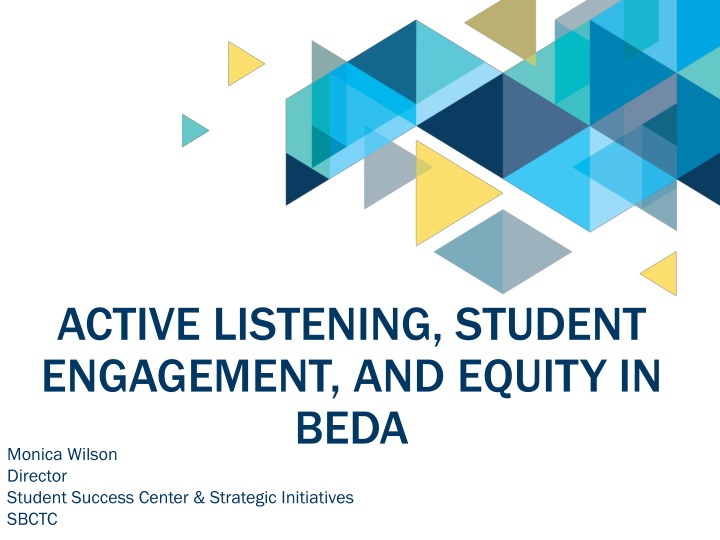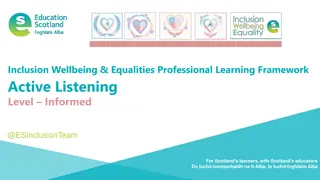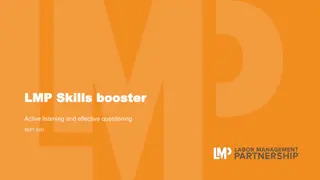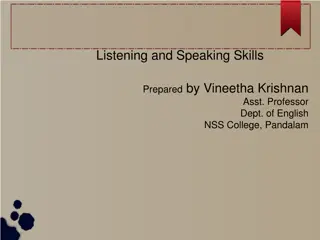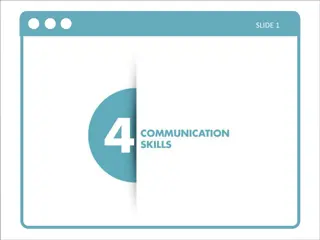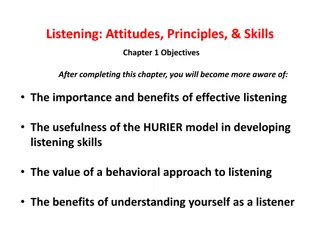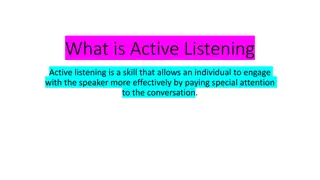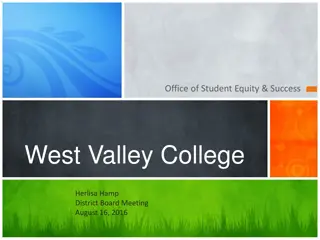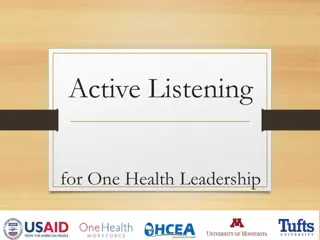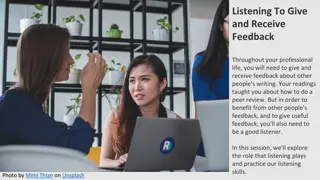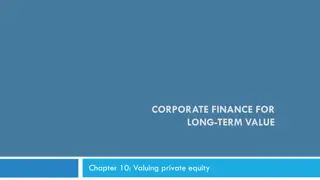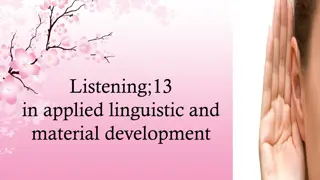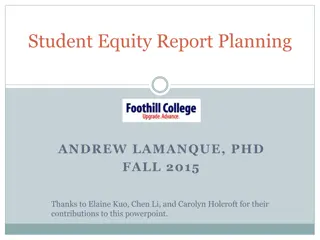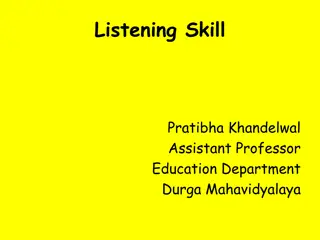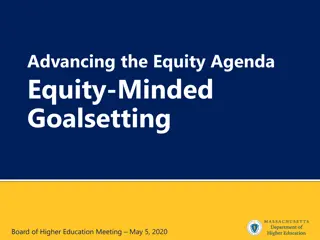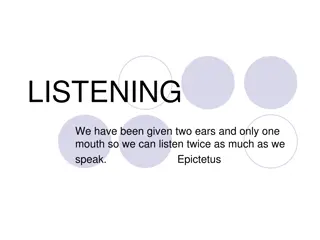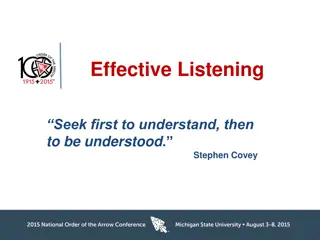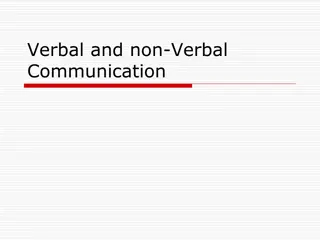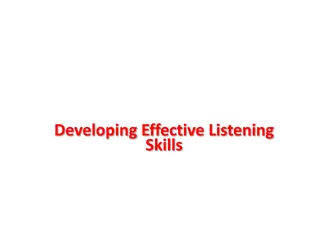ACTIVE LISTENING, STUDENT ENGAGEMENT, AND EQUITY IN BEDAMonica.WilsonDirector
Focusing on active listening, student engagement, and equity, Monica Wilson, the Director of Student Success Center & Strategic Initiatives at SBCTC, emphasizes the importance of these elements in educational settings to foster positive outcomes for students.
Download Presentation

Please find below an Image/Link to download the presentation.
The content on the website is provided AS IS for your information and personal use only. It may not be sold, licensed, or shared on other websites without obtaining consent from the author.If you encounter any issues during the download, it is possible that the publisher has removed the file from their server.
You are allowed to download the files provided on this website for personal or commercial use, subject to the condition that they are used lawfully. All files are the property of their respective owners.
The content on the website is provided AS IS for your information and personal use only. It may not be sold, licensed, or shared on other websites without obtaining consent from the author.
E N D
Presentation Transcript
ACTIVE LISTENING, STUDENT ENGAGEMENT, AND EQUITY IN BEDA Monica Wilson Director Student Success Center & Strategic Initiatives SBCTC
This workshop is designed to empower advisors, navigators, coaches and other student facing staff in BEdA to advance equity and student success. In this session, participants will explore the intersection of constructivist listening, student agency, and equity advancing practices to gain practical insights and strategies to better support adult learners on their educational journey. This action-oriented experience will provide opportunities for deep conversation and learning from others in the system while building individualized approaches to the application of coaching techniques that center student experiences to advance equity within BEdA programs and beyond. 2
OUR TIME TOGETHER Building community Our Collective Why: Equity and Justice in the CTCs Community and Cultural Wealth Lens of Systemic Oppression Equity Coaching as a lever for change 3
COMMUNITY EXPECTATIONS Keep Race on the Table Challenge us to keep digging deeper: Engagement. Ownership of impact Plenty of unfinished business 4
Identities Family Faith Background Special talents or interests Other INFORMAL INTRODUCTIONS Take 90 seconds to share about yourself, not including any information about your work or education, etc. 5
COLLECTIVE VISION: EQUITY & JUSTICE BEdA guiding documents Constructivist listening Notice and wonder protocol 6
OUR WHY: ADVANCNG EQUITY AND JUSTICE SBCTC Vision SBCTC Vision Leading with racial equity, our colleges maximize student potential and transform live within a culture of belonging that advances racial, social, and economic justice in service to our diverse communities. BEdA Vision BEdA Vision To advance racial and economic justice, Basic Education for Adults provides equitable programming for all Washingtonians to realize their potential as they launch on a supported college and career pathway to living-wage employment and strengthen the vitality of their communities. BEdA Mission BEdA Mission Basic Education for Adults works collaboratively to offer culturally responsive and equity focused college and career pathways that address barriers and enable students to obtain meaningful employment, meet workforce needs, and reduce economic disparities. 7
Basic Education for Adults work is guided and informed by our commitment to: Students cultural Students cultural capital: voice, capital: voice, experience, experience, perspective perspective Diversity, equity, inclusion: racial, economic, and social justice Quality: collaborative, evidence-based innovative pathways Our success is measured by the success of our students. 8
CONSTRUCTIVIST LISTENING: BEDA GUIDING DOCS Equal time. No interruption. Confidentiality. No criticism. Undivided attention. Engaging in conversations that are both intellectually demanding and emotionally challenging. LISTENING PROMPTS What did you notice in the documents? Does anything need to be clarified? What are you wondering? Give full attention to another person to hold space for them to: Construct new meaning about challenges Release emotion Reflect 9
DEBRIEF: How was it to listen? How was it to be listened to? Strengths? Challenges? 10
STUDENTS CULTURAL CAPITAL: VOICE, EXPERIENCE, PERSPECTIVE Questions that invite student s culture into the space Understanding the ways that oppression interacts with the student experience Exploring our beliefs about equity in coaching 11
Aspirational Aspirational capital capital Ask students that allow them to share hopes and dreams for their future, inviting them to share those of their families as well. Familial Familial capital capital Ask questions that helps define what family means and who is in theirs. Ask students about the people who make up their community. How are they connected to that community at home and on campus? What do these connections mean to them? How can they leverage those connections in their lives? Social capital Social capital Linguistic Linguistic capital capital Provide opportunities for students to communicate in the ways that feel the most natural to them, with special awareness of storytelling. Navigational Navigational capital capital One study suggests that drawing on a student s home community may be more effective than the default design of mentoring programs. Resistance Resistance capital capital Provide resources for students to learn more about the history of social justice and inequality, and to present and discuss solutions. 13
CONSTRUCTIVIST LISTENING: STUDENT CULTURAL WEALTH Equal time. No interruption. Confidentiality. Engaging in conversations that are both intellectually demanding and emotionally challenging. No criticism. Undivided attention. LISTENING PROMPTS Share what you notice about the wealth BEdA students and colleagues bring with them into the program. What is a question you could build into your daily practice that affirms the cultures of students and colleagues in your time together? Give full attention to another person to hold space for them to: Construct new meaning about challenges Release emotion Reflect 14
USING A LENS OF SYSTEMIC OPPRESSION A lens is a metaphor to communicate the idea of looking at an event, experience, and/or a set of data through a particular perspective. Each of us views the world through a set of lenses everyday it is how we read and make meaning of the world. Name some of the ways that the layers of systemic oppression impact the BEdA student experience Structural Structural: How these effects interact and accumulate across institutions and across history Institutional: Institutional: Policies and practices at the organization or sector level that perpetuate oppression Interpersonal: Interpersonal: the interactions between people both within and across difference Individual: Individual: A person s beliefs & actions that serve to perpetuate oppression 15
CONSTRUCTIVIST LISTENING: LENS OF OPPRESSION Equal time. No interruption. Confidentiality. Engaging in conversations that are both intellectually demanding and emotionally challenging. No criticism. Undivided attention. LISTENING PROMPTS Share what you notice about the wealth BEdA students bring with them into the program. What is a question you could build into your daily practice that affirms the cultures of students in your time together? Give full attention to another person to hold space for them to: Construct new meaning about challenges Release emotion Reflect 16
COACHES Believe others are as creative, resourceful, and whole where the solutions live Elicit solutions from those impacted Focus on transformation Focus on intentional action to fulfill mission Brings out best in whole team collective intelligence Builds capacity to come up with best answers for the student and college Sees students and college striving to be best self/college 17
EXPLORING BELIEFS ABOUT EQUITY It is a coach s responsibility to address inequities when they are observed If there is not an expectation of equity conversation, the coach shouldn t break that unspoken agreement. If a coach is going to talk about educational inequity, they should have training in how to do this. They need to know what racism is, how to create antiracist spaces, and how to talk about inequity. A coach doesn t need to have extensive training in antiracism to address inequities that they observe When a coach witnesses inequities, it s their responsibility to tell administrators and let them deal with it. Coaching around issues of race and other biases is uncomfortable and hard. Coaching around issues of race and other biases can be healing for everyone. 18
COACHING STRATEGIES Naming and describing coaching styles and when to use them Consideration of coaching conversations with students, colleagues, and organizational leaders 19
COACHING STRATEGIES Style Style What It Is What It Is Prescribing Prescribing recommendations to another When You Use It When You Use It Give directions, advice/or If the client lacks confidence If the client is unable to direct their own learning yet If there are legal, safety, ethical, quality guidelines Informing Informing Giving information and knowledge to another Showing where to find extra help, information Supply missing facts Explaining what just happened Telling your own experiences Confronting Confronting Challenging another s assumptions: stimulating their awareness of their own behavior, attitudes or beliefs To show consequences of the client s actions To challenge the client to re- think assumptions To raise the client s awareness of others perceptions To boost the client s confidence by affirming success Helping another to release tension and to release or come to terms with emotions which are blocking their progress Cathartic Cathartic If the client is afraid of risk or failure If the client feels incompetent If the client is frustrated, unmotivated Catalytic Catalytic Helping another to self-discovery, to self- directed learning, and to solving their own problems To achieve a deeper level of understanding To encourage the learner to take responsibility To promote motivation and commitment Supporting Supporting Building another s self-esteem, self- confidence and self- respect To build morale and self- confidence To encourage risk taking To reward success, promote further learning 20
CONSTRUCTIVIST LISTENING: MAKING MEANING Equal time. No interruption. Confidentiality. Engaging in conversations that are both intellectually demanding and emotionally challenging. No criticism. Undivided attention. LISTENING PROMPTS What was a highlight from the session? What is something you discussed or learned today that you will put into action? What are you curious about moving forward? Give full attention to another person to hold space for them to: Construct new meaning about challenges Release emotion Reflect 21
Questions? Comments? Feedback? Collaboration? Monica Wilson mwilson@sbctc.edu CC BY 4.0, except where otherwise noted. 22
